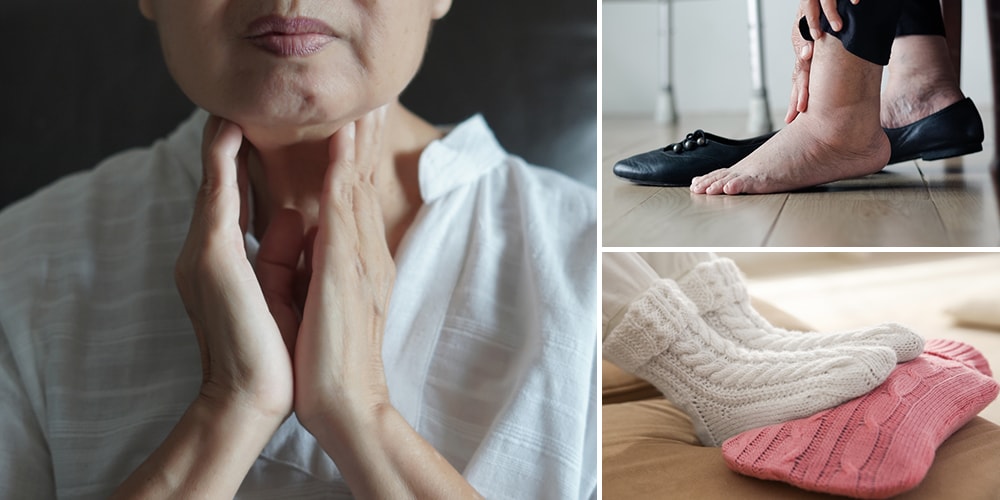
10 Signs Your Feet Are Warning You About a Thyroid Problem
The thyroid is a part of the endocrine gland that controls the body’s function by secreting hormones. Its main function is to control metabolism or metabolic rate that transforms food intake into energy. When the system is impaired, it either increases or decreases its hormone secretion. Thus, metabolic activities are also impaired and the body processes are affected.
Hypothyroidism & Hyperthyroidism
The thyroid gland interacts with every organ system like the cardiovascular, digestive, reproductive, and nervous systems. When there is a dysfunction of the thyroid gland, its warning signs are different and are often overlooked. More commonly the patient may experience mental and physical lethargy and some changes in their feet.
The thyroid can malfunction in many different ways and give rise to other conditions like goiter, thyroiditis, Grave’s disease, and Hashimoto’s thyroiditis. But generally, the common classifications are hypothyroidism (underactive hormone production) and hyperthyroidism (overactive thyroid). The conditions manifest different symptoms often observed in the upper and lower extremities.
Sometimes, thyroid problems pass on with latent symptoms. Before it gets worse, examine your feet for the following signs that may indicate thyroid issues.
10 Signs Your Feet Are Warning You About a Thyroid Problem
Dry And Flaky Feet
Some people have naturally dry skin that can be rough, scaly and peeling. People with low levels of thyroid hormones or hypothyroidism also experience changes to the skin. The decrease in sweating causes coarse and flaky skin that does not go away after applying moisturizer. It appears anywhere in the body but more particularly in the feet and often develops into calluses.
To manage dry and flaky feet in hypothyroidism, use mild soap and moisturizer that contains ammonium lactate. These keratolytic agents dissolve the top layer of the skin to become more effective in penetrating the epidermis.
Itchy Feet
Itching is a symptom of thyroid imbalance that can happen anywhere in the body – the legs, scalp or genitals. The itchiness can occur without a rash or in some cases develop untreatable hives. The tingling is a result of dry skin or is associated with thyroid autoimmunity. Pruritus, the medical term for itchy skin, can appear in both hypothyroidism and hyperthyroidism. Hives (urticaria), or raised welts, may also occur.
To remedy thyroid itching, anti-itch creams and antihistamines may be given. Olive oil, oats and neem may also be applied topically or used in bath water to alleviate the condition.
Tingling Sensation
The edema or fluid buildup in the cells puts up pressure on the nerves of the legs and feet. Tingling feet is a common sign of underactive thyroid which indicates damage to the nerves. Sometimes, hypothyroidism also affects the hand causing numbness or carpal tunnel syndrome. As the nerve function slows down, numbness and needle-prickling sensations in the feet are often felt.
When left untreated hypothyroidism can cause severe nerve damage or peripheral neuropathy. To minimize the strain that fluid retention creates, exercising and maintaining a healthy weight can mitigate the situation.
Cold Feet
Underactive thyroid functions interfere with the metabolism that controls the heartbeat and temperature. It disrupts blood circulation as the heart struggles to pump blood causing the patient to feel chilly. And since the hands and feet are farthest away from the heart, they feel cold more intensely.
If you are struggling to keep your feet warm, try wearing insulated footwear and wool socks. Soaking feet in warm water may also help manage cold feet in hypothyroidism.
Smelly Feet
In hyperthyroidism, the thyroid gland has an overproduction of hormones. It makes the body sweat profusely, especially in areas of the underarms, groins, hands and feet. The secretion from the apocrine gland in the feet leaks a stinky odor when bacteria grow on the sweat.
Smelly feet are embarrassing and may not be totally eradicated by antifungal and antibacterial soaps. A foot soak of vinegar, Listerine or guava leaves may curb smelly feet. It is also better managed by wearing sandals or going barefoot whenever possible to reduce moisture.
Foot Infections
The cracked and dry skin that thyroid issues create often leads to foot infections. Fungal infections like athlete’s foot are a common sign of a malfunctioning thyroid gland. It can occur in the toenails and fingernails as manifested symptoms of either hyperactive or underactive thyroid.
It could start as swelling and a wound that drips puss and eventually discolor the nails. A doctor would prescribe antibiotics for the abscess. To prevent its spread, provide proper ventilation to keep it away from moisture. A warm foot bath with crushed garlic is also helpful to curb the growth of fungi and reduce inflammation.
Toenail Abnormalities
Dry cuticles, slow nail growth, splitting, peeling and abnormal shape of nails may indicate thyroid dysfunction. The symptoms are observed in hypothyroidism where the toenails also turn yellow and develop longitudinal ridges.
Hyperthyroidism manifests a different sign that also appears in the toenails. As opposed to hypothyroidism signs, overactive thyroid causes faster nail growth. The toenails get discolored and the cuticles and half-moon are absent. Onycholysis, the splitting of the nails from the nail bed, may also occur.
Check out this easy and effective Thyroid Protocol available at page 103 in The Holistic Guide to Wellness.
Swollen Feet
Edema or fluid retention that causes puffiness and swelling is a late symptom of thyroid problems. Thyroid dysfunction causes a deposit of sugar molecules in the skin. These compounds attract water that results in swelling or pitting edema. Pitting edema means that a pit or indentation remains on the skin when it is pressed.
The home remedy for hypothyroidism edema is consuming low-salt products and diuretics. Dietary adjustment and lifestyle changes like avoiding alcohol are also important.
Yellow Soles
When the thyroid fails to produce enough hormones, the body cannot metabolize the nutrients that it takes. Beta-carotene, for example, needs hormones to transform it into vitamin A. The lack of it would collect the beta-carotene, which is the compound that gives carrots their bright orange color. The body cannot process and get rid of these carotenes as waste. Its buildup results in the yellowing of the skin which is more noticeable in the soles of the feet.
Sore Feet
Painful feet, muscle cramps and stiffness occur due to thyroid hormone deficiency. Sometimes, weakness and cramping can occur in the hips and shoulders but are more often prevalent in the feet. Along with the pain, the muscle could also enlarge and further cause breakdown.
Cramping and soreness are common symptoms of hypothyroidism. In hyperthyroidism, aches are not always present but patients could feel muscle weakness. It makes climbing the stairs, reaching above the head or gripping objects difficult. For chronic foot pain and cramping without any cause, consider testing your thyroid which may identify the problem.
Homeopathic Remedies for Thyroid
People experiencing stress or depression are susceptible to thyroid problems. It can be prevented by a few plants that help maintain their balance and hormone secretion. Adaptogenic herbs are helpful in maintaining body balance and restoring overall well-being. The most excellent plants for thyroid protection are: Ashwagandha, Walnut, Irish moss, Kelp, Coconut Oil, Ginger, Lemon Balm, Coleus.
Foods rich in L-tyrosine also regulate hormone production. It is an amino acid found in protein-rich food. You can get it from lean meats, fish, lean chicken breast, firm tofu, beans, seeds, wild rice, cheese and milk.
Takeaway
Issues with the thyroid are dealt with differently by doctors according to the symptoms and test results. Sometimes, the suboptimal symptoms of thyroid are ignored until the condition is worse. But early diagnoses and intervention are important to prevent it from affecting the overall bodily processes.
Once you notice some changes in your feet and skin, do not hesitate to consult a doctor for a blood test. The thyroid test includes looking at the TSH (Thyroid Stimulating Hormone) and T4 (Thyroxine). An imbalance of these levels indicates problems with the thyroid.

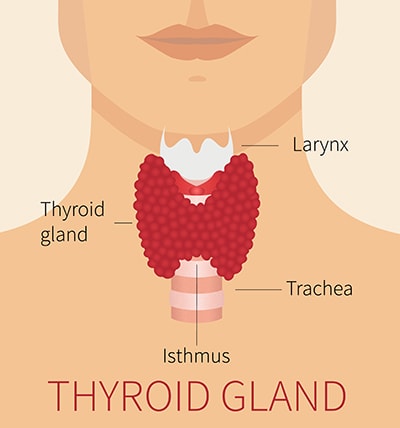
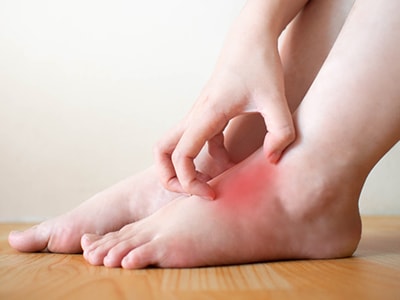
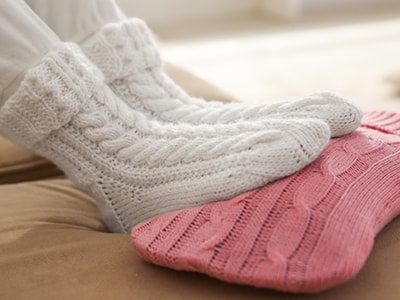
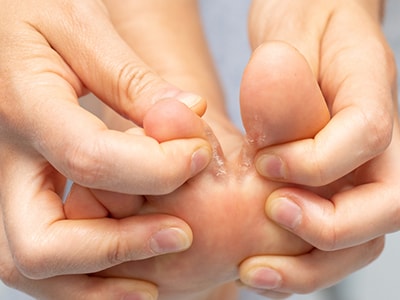
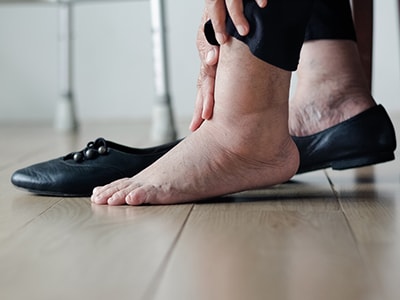
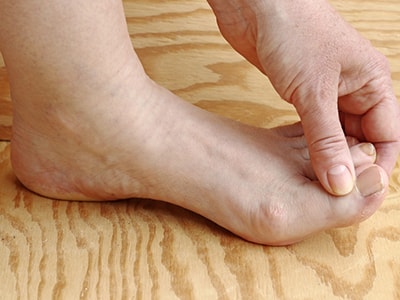
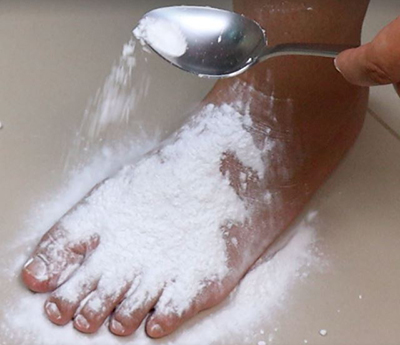
Is there a Spanish version of the books ?
Hi Norbert,
Thank you for your interest in our books! For the moment there isn’t a Spanish version, but we’ll let you know if we’ll have one in the future.
Many blessings and good health!
Is there anything else I can do to help my Hashimoto? I was diagnosed about a year ago and started on Levothyroxine about 9 months ago and have had problems with this medication. I would love to get off it but have no idea where or how to begin, and I would rather be doing something more natural. I’m just not sure where to look. I’m signed up for your emails and was happy to see this one. Please do more for things like this. Thank you.
Hi Mary,
We’re sorry to hear that. You might be interested in the articles below as well:
https://thelostherbs.com/anti-inflammatory-diet-for-autoimmune-conditions/
https://thelostherbs.com/10-most-powerful-autoimmune-herbs/
https://thelostherbs.com/top-5-diet-changes-for-autoimmunity/
Also, in Nicole Apelian’s latest book, The Holistic Guide to Wellness: Herbal Protocols for Common Ailments, she included a chapter about Hashimoto’s Thyroiditis. If you’re interested, you can find the book in our Store.
Many blessings and good health!